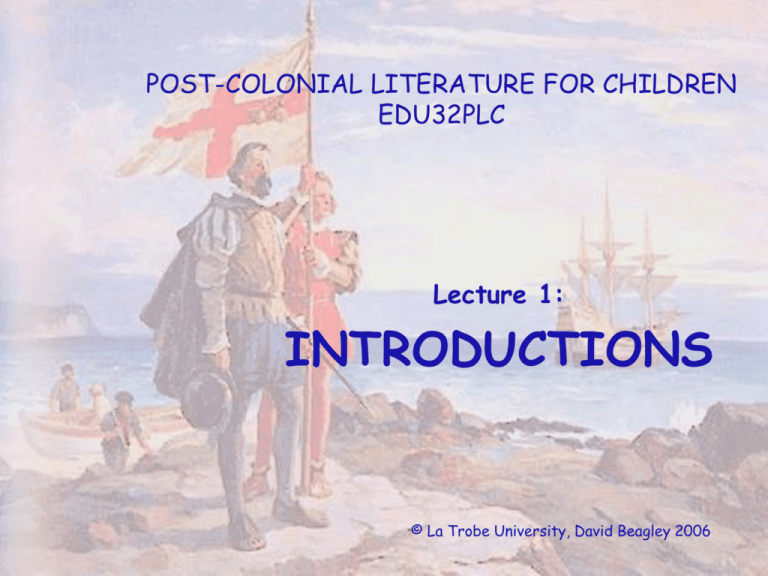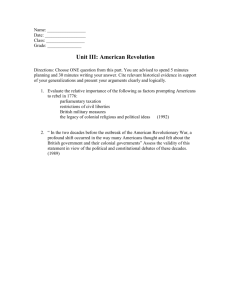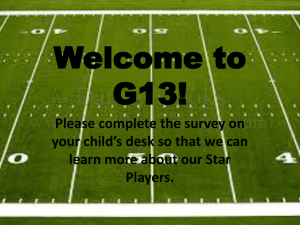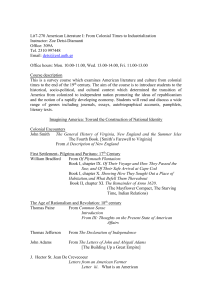post-colonial literature for children edu32plc
advertisement

POST-COLONIAL LITERATURE FOR CHILDREN EDU32PLC Lecture 1: INTRODUCTIONS © La Trobe University, David Beagley 2006 Me David Beagley • d.beagley@latrobe.edu.au • Tuesdays and Thursdays – Rm. 3.16c Education • Mondays, Wednesdays, Fridays – Information Services, Heyward Library • Children’s Literature web site at http://www.latrobe.edu.au/childlit Unit Unit concept: • 4th unit of Children’s Literature “course” and presumes an understanding of literary analysis. • Will be more “academic” than previous units, demanding consideration of literature as a social construct and commentary, not just a teaching or recreation tool. • Will involve historical, social, cultural, political issues and judgements, as well as literary. Unit Structure: • 2 lectures, 1 tutorial per week Requirements: • Attendance and contribution to tutorials and lectures (10%) • Portfolio of 4 shorter pieces - 2 commentaries on topics raised in lectures, and 2 studies of extension texts (20%) • Major essay (30%) • Examination (40%) • Listen, Consider, Make an Effort Unit Sources and resources: • Unit Outline - Course notes, timetable with reading lists, unit information. • Readings on Reserve and E-reserve. • Library Subject Guide for Children’s Literature at http://www.lib.latrobe.edu.au/help/subject-res/childrens-lit/ • Children’s Literature web site at http://www.latrobe.edu.au/childlit • Your own research: in library, through databases, and elsewhere (valid and authoritative) Today’s relevant readings • Bradford, C. (2001) The End of Empire? Colonial and postcolonial journeys in children’s books. Children’s Literature [online]. 29: 196 218. Available: Proquest • Kohl, H. (1995) Should we burn Babar? Questioning power in children’s literature. Should We Burn Babar? Essays on children’s literature and the power of stories. New York: The New Press. • Said, E. (1994) Introduction. Culture and Imperialism. New York: Vintage Books • The Imperial Archive http://www.qub.ac.uk/en/imperial/imperial.htm Post-colonialism 2 word elements: Post- and Colonialism • Colonialism : Imperialism, control/authority over one culture/society by another. Implied superiority of colonial power, and consequent inferiority of colonised. • Post- : after. Thus, the literatures of the colonised, focussing on the effects of that colonisation. Post-colonialism - questions Who is a colonised people? • Australian Aboriginals, Australian Europeans • USA : Indians - Native Americans /Europeans/Afro-Americans/Arab-Americans Is it only writing about colonial influence, or any writing? Form and Voice: in own traditional literary forms? in styles of colonial power? by former colonisers in post-colonial forms? Vocabulary • • • • • • Colonialism Imperialism Colony and Empire Imperial centre Indigenous and Native Expatriate • • • • • • Diaspora Sub-altern Stereotype Archetype Voice Orientalism Colonial Values • Common pattern throughout recorded history – Egypt, Persia, Rome, China etc. • From 1500s, imperialistic European countries ‘claimed’ new world colonies in Africa, India, South America, North America, Asia, and Australia for various reasons: cheap raw materials for ‘home’ industries; trade advantages over rival European countries; belief in the need to exert global influence against rivals. missionary zeal/duty to bring civilization – c.f. Pax Romana, Crusades, Cold War The White Man’s Burden Civilization and the Exotic • Rudyard Kipling - The White Man’s Burden • Henry Newbolt - Vitae Lampada The White Man’s Burden Civilization and the Exotic Explorer/Native, Ruler/Ruled distinctions Each is defined by the other; e.g.: – For the explorer to discover, the discovery must be unknown by civilization – For the “Ruler” to be superior, the “Ruled” must be inferior For this relationship to be ongoing, it must be validated: – Civilization, improvement – Morality, religion – Duty, role Physical environment The physical environment was seen as: • ‘unowned’ and ‘uninhabited’ – terra nullius • rich in natural resources (including humans for the slave trade) but dangerous because of local fauna and flora • places for ‘exploration’ and heroic adventure • as both exotic, tropical paradise and as over-heated, disease-ridden exile from ‘home’ • not a suitable place for females from ‘home’ to live Indigenous peoples The indigenous peoples were seen as: • • • • • childlike primitives in need of education, western civilisation and religion dangerous sub-human heathens who needed to be eradicated – standing in the way of civilization having inferior, primitive customs, eating habits, clothing, housing, social values, and primitive superstitions and beliefs arrested evolutionary and cultural development not having the rights of western people, and therefore appropriate to treat as slaves and trophies to be brought ‘home’ to Europe and North America. The duty of the colonizers Colonisers in these colonies were expected to: • provide a model of behaviour for the indigenous people, yet … • remain separate from ‘locals’ • maintain the standards of ‘home’ So, where does Literature come into all this? Literature is an indicator of what matters, and what has happened, in a society Colonial literature presents the colonial ethos Post-colonial represents how the world has changed Literature can be an agent for change Can rewrite the colonial history to highlight what was suppressed Can seek to achieve de-colonization by – re-establishing identity and pride – subverting the colonial themes, genres, values or language Can reshape current attitudes by recognition of the past








